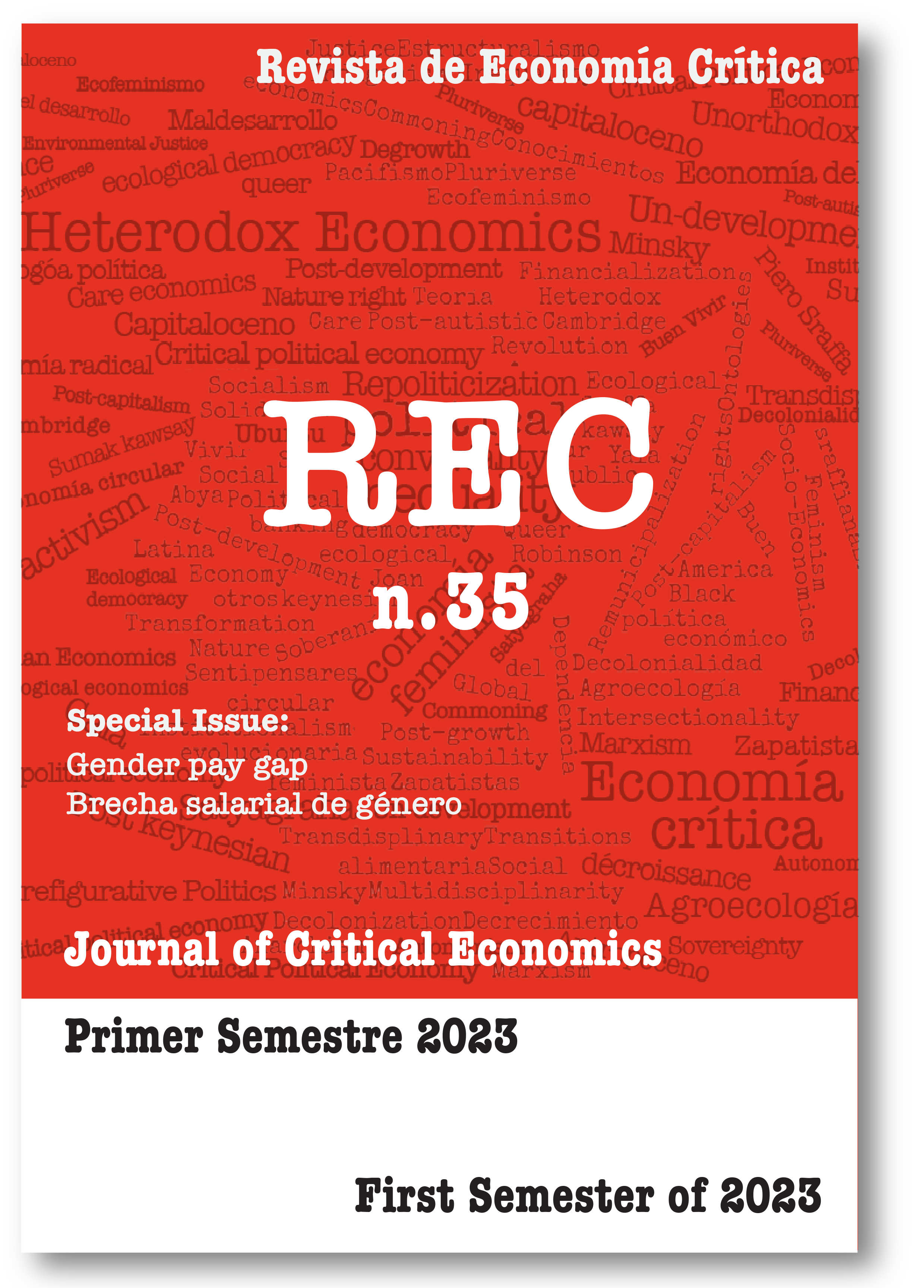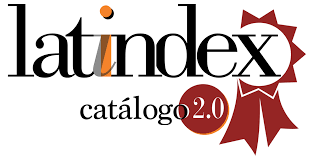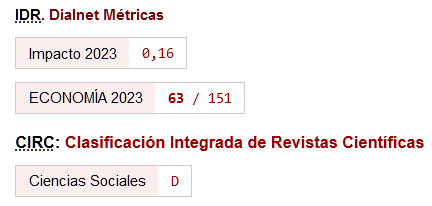The underuse of women’ skills at work
DOI:
https://doi.org/10.46661/rec.8967Keywords:
Cognitive skills, Skills' gender gap, Skills' underuseAbstract
Context: At work, men and women do not do the same, nor do they use the same skills equally. This fact is no longer related to less training and partially explains the wage gap. Thus, the hypothesis that, at work, women underuse their skills more than men is plausible. Objective: To check whether, at work, women underuse their cognitive skills more than men. Method: Spanish data from the Adult Skill Survey (n=6055), a survey promoted by the OECD within the PIAAC, is used to contrast if there are differences (α=0.05) between men and women in how they use four cognitive skills (reading, writing, numeracy skills and ICT) between what is done outside and inside work. If differences are found, a logit model is adjusted to assess the causes of these differences. Results and conclusions: Women use more their writing and numerical skills outside work than at work compared to men. Writing underuse is explained by personal and job circumstances. For numerical skills, being a woman has a specific weight as an explanatory variable. Mathematics is a competence sought and remunerated by the market and for which the educational differential persists.
Downloads
References
Azmat, G., & Petrongolo, B. (2014). Gender and the labor market: What have we learned from field and lab experiments? Labour Economics, 30, 32-40. https://dx.doi.org/10.1016/j.labeco.2014.06.005 DOI: https://doi.org/10.1016/j.labeco.2014.06.005
Babcock, L., Recalde, M. P., Vesterlund, L., & Weingart, L. (2017). Gender differences in accepting and receiving requests for tasks with low promotability. American Economic Review, 107(3), 714-747. https://doi.org/10.1257/aer.20141734 DOI: https://doi.org/10.1257/aer.20141734
Blau, F. D., & Khan, L. M. (2003). Understanding international differences in the gender pay gap. Journal of Labor Economics, 21, 106-144. http://dx.doi.org/10.1086/344125 DOI: https://doi.org/10.1086/344125
Blau, F. D., & Khan, L. M. (2017). The gender wage gap: extent, trends, and explanations. Journal of Economic Literature, 55(3), 789-865. https://doi.org/10.1257/jel.20160995 DOI: https://doi.org/10.1257/jel.20160995
Christl, M., & Köppl–Turyna, M. (2020). Gender wage gap and the role of skills and tasks: evidence from the Austrian PIAAC data set. Applied Economics, 52(2), 113-134. https://doi.org/10.1080/00036846.2019.1630707 DOI: https://doi.org/10.1080/00036846.2019.1630707
Corbella, T., Alarcón, A., & Andraszak, J. (2021). Language gender gap at work across OECD countries: Quantitative and controversial evidence. Language Problems and Language Planning, 45(3), 284-308. https://doi.org/10.1075/lplp.21007.ala DOI: https://doi.org/10.1075/lplp.21007.ala
Croson, R., & Gneezy, U. (2009). Gender differences in preferences. Journal of Economic Literature, 47(2), 448-474. http://dx.doi.org/10.1257/jel.47.2.448 DOI: https://doi.org/10.1257/jel.47.2.448
De la Rica, S., & Rebollo-Sanz, Y. F. (2019). From gender gaps in skills to gender gaps in wages: Evidence from the PIAAC. ISEAK, working paper 2019/3.
Ginther, D. K., & Kahn, S. (2021). Women in academic economics: Have we made progress? AEA Papers and Proceedings, 111, 138-142. https://doi.org/10.1257/pandp.20211027 DOI: https://doi.org/10.1257/pandp.20211027
Goldin, C., & Rouse, C. (2000). Orchestrating impartiality: The impact of "blind" auditions on female musicians. American Economic Review, 90(4), 715-741. http://dx.doi.org/10.1257/aer.90.4.715 DOI: https://doi.org/10.1257/aer.90.4.715
Goldin, C. (2014). A grand gender convergence: Its last chapter. American Economic Review, 104(4), 1091–1119. http://dx.doi.org/10.1257/aer.104.4.1091 DOI: https://doi.org/10.1257/aer.104.4.1091
Hanushek, E. A., Schwerdt, G., Wiederhold, S., & Woessmann, L. (2015). Returns to skills around the World: Evidence from PIAAC. European Economic Review, 73, 103-130. https://dx.doi.org/10.1016/j.euroecorev.2014.10.006 DOI: https://doi.org/10.1016/j.euroecorev.2014.10.006
Hesli, V. L., & Lee, J. M. (2011). Faculty research productivity: Why do some of our colleagues publish more than others? PS: Political Science and Politics, 44(2), 393–408. http://dx.doi.org/10.1017/S1049096511000242 DOI: https://doi.org/10.1017/S1049096511000242
Keller, E. (2019). Labor supply and gender differences in occupational choice. European Economic Review, 115, 221-241. https://doi.org/10.1016/j.euroecorev.2019.03.002 DOI: https://doi.org/10.1016/j.euroecorev.2019.03.002
Lindemann, D. J. (2015). Gender and numeracy skill use: Cross-national revelations from PIAAC. Retrieved IX/2022 from https://static1.squarespace.com/static/51bb74b8e4b0139570ddf020/t/54da75e1e4b02b7088614c36/1423603169721/Lindemann_PIAAC.pdf
MINISTERIO DE EDUCACIÓN, CULTURA Y DEPORTE. (2013). PIAAC Programa internacional para la evaluación de las competencias de la población adulta. Informe español. Volumen I. ed. Subdirección General de Documentación y Publicaciones del MECD.
Neumark, D. (2018). Experimental research on labor market discrimination. Journal of Economic Literature, 56(3), 799-866. http://dx.doi.org/10.1257/jel.20161309 DOI: https://doi.org/10.1257/jel.20161309
OCDE (2010). PIAAC background questionnaire MS version 2.1 d.d. 15-12-2012.
OCDE (2013). The survey of adults skills. Reader's companion. OCDE Publishing. http://dx.doi.org/10.1787/9789264204027-en DOI: https://doi.org/10.1787/9789264204027-en
Pampel, F. C. (2021). Logistic regression. A primer. Sage. Series: Quantitative Applications in the Social Science, 132. https://doi.org/10.4135/9781071878729 DOI: https://doi.org/10.4135/9781071878729
Peto, R., & Reizer, B. (2021). Gender differences in the skill content of jobs. Journal of Population Economics, 34, 825-864. https://doi.org/10.1007/s00148-021-00825-6 DOI: https://doi.org/10.1007/s00148-021-00825-6
Petit, P. (2007). The effects of age and family constraints on gender hiring discrimination: a field experiment in the French financial sector. Labour Economics, 14, 371-391. http://dx.doi.org/10.1016/j.labeco.2006.01.006 DOI: https://doi.org/10.1016/j.labeco.2006.01.006
Petrongolo, B., & Ronchi, M. (2020). Gender gaps and the structure of local labor markets. Labour Economics, 64, article 101819. https://doi.org/10.1016/j.labeco.2020.101819 DOI: https://doi.org/10.1016/j.labeco.2020.101819
Riach, P. A., & Rich, J. (2006). An experimental investigation of sexual discrimination in hiring in the English labor market. BE Press Advances in Economic Analysis & Policy, 6(2), advances, article 1. http://www.bepress.com/bejeap/advances/vol6/iss2/art1 https://doi.org/10.2202/1538-0637.1416 DOI: https://doi.org/10.2202/1538-0637.1416
Rodríguez Pérez, R. E., & Limas Hernández, M. (2017). Propuestas teóricas y evidencia empírica sobre desigualdad salarial por género. Revista de Economía Laboral, 14(2), 104-136. http://dx.doi.org/10.21114/rel.2017.02.05 DOI: https://doi.org/10.21114/rel.2017.02.05
Ruiz-Gálvez Juzgado, M. E., & Vicent Valverde, L. (2015). La realidad salarial de las mujeres en el mercado laboral español. Libro de actas del V Congreso de Economía Feminista, 81-116. https://congresoeconomiafeminista.org/download/libro-de-actas-del-v-congreso-de-economia-feminista/
Solnick, S. (2001). Gender differences in the ultimatum game. Economic Inquiry, 39, 189-200. http://dx.doi.org/10.1111/j.1465-7295.2001.tb00060.x DOI: https://doi.org/10.1111/j.1465-7295.2001.tb00060.x
Von Davier, M., Weeks, J., Chen, H., Allen, J., & Van Der Velden, R. (2013). Creating simple and complex derived variables and validation of background questionnaire data, en OCDE. Technical Report of the Survey of Adult Skills (PIAAC), pre-publication copy, chapter 20, 1-21. https://www.oecd.org/skills/piaac/_Technical Report_17OCT13.pdf
Downloads
Published
How to Cite
Issue
Section
License
Copyright (c) 2023 Teresa Corbella Domènech, Amado Alarcón Alarcón

This work is licensed under a Creative Commons Attribution 4.0 International License.
This licence allows third parties to share (copy and redistribute the material in any medium or format) and adapt (remix, transform and create from the material for any purpose, including commercial purposes), provided that authorship and first publication in this journal (The Journal, DOI of the work) is acknowledged, a link to the licence is provided, and it is stated whether changes have been made to the work.







